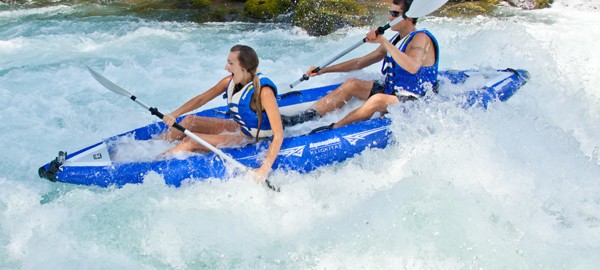As the weather heats up in the Northern Hemisphere, thoughts turn to outdoor activities and “fun-in-the-sun.” If you’ve arrived at this blog article, you’re already intrigued with the idea of paddling across a lake, down a lazy river or along a coastline, and are looking into inflatable kayaks. Maybe you have limited space, want to pack into the back country, need lighter weight options or travel in an RV. Regardless of the motivation, there are a myriad of choices which can be daunting.
To help you narrow down the field, AirKayaks has put together a table comparing our inflatable kayak options. We have listed the following details – manufacturer, model name and stock number, price range, number of paddlers, kayak lengths, widths, weights, payloads, # of chambers, inflation pressures, design style and kayak type.
We have divided our inflatable kayak list into three sections sorted by kayak style – enclosed, open and sit-on-top – and within that, by length. To help you get going, we describe the attributes of each style first. For further information on inflatable kayak choices, benefits and definitions, please also see our popular guide to Choosing an Inflatable Kayak – What You Should Consider.
Enclosed Design Inflatable Kayaks
The enclosed hull design is similar to many hard shell kayaks; this is shown above in the Advanced Elements AdvancedFrame DS-XL kayak. The snugger cockpit design keeps excess water and wind from entering the kayak, and also less direct sun. Many of them have coamings (the gray tube in the photo above, encircling the cockpit) that allow you to attach a spray skirt.
What is a spray skirt? This is an accessory that attaches to the kayak around the coaming, and then again to your body (shown above on an Innova Swing). The function is to keep out even more wind and water.
Many of the enclosed decks can be zipped open for easy entry or to cool off, but the benefits of the enclosed design include the ability to kayak in windier and colder climates/situations (shown above, the Advanced Elements AirFusion Elite).
A closed-design tandem can also be paddled solo, but it is not as balanced as the paddler must sit in the rear fixed cockpit, rather than the optimal position “just rear of center.” Typically, adding weight to the front will help balance out the kayak (as shown with Eddie sitting in the front cockpit of an Innova Swing 2 inflatable kayak).
Open Design Inflatable Kayaks:
This includes the largest number of kayaks. The open design consists of a kayak with higher walls – which keeps out some water – but a much more open design (shown above on the AquaGlide Chelan Tandem XL for 1-3 paddlers). The benefits include the ability to adjust the
